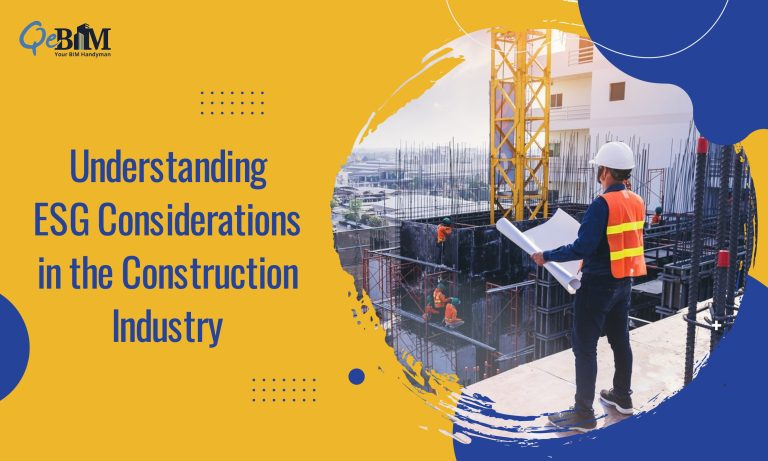Understanding ESG Considerations in the Construction Industry

In recent years, the ESG (Environmental, Social, and Governance) criteria have become increasingly important across various industries including the construction sector as well. These criteria are the framework for evaluating how companies can manage risks and opportunities relevant to the sustainability and societal impact.
For construction companies, integrating the ESG considerations into their operations is not just about the compliance but also about fostering responsible practices that contributes towards the long-term environmental consideration, social equity as well as good governance.
Environmental Considerations
- Sustainable Building Materials:
The construction industry consumes a substantial amount of natural resources and is a major contributor to environmental degradation. According to the United Nations Environment Programme (UNEP), buildings and construction account for 36% of global energy use and 39% of energy-related carbon dioxide emissions annually. Choosing sustainable building materials like recycled steel, reclaimed wood, and low-carbon concrete can greatly diminish the construction industry’s carbon footprint and lessen resource depletion. - Energy Efficiency:
Enhancing energy efficiency in buildings is essential for minimizing their environmental footprint. The International Energy Agency (IEA) estimates that energy-efficient buildings could reduce global primary energy demand by 8% by 2040. Techniques such as better insulation, advanced HVAC systems, apt Energy Efficiency Services, and integration of renewable energy sources like solar panels or geothermal heating not only lower energy consumption but also decrease greenhouse gas emissions during a building’s operational life. - Waste Management and Recycling:
Construction and demolition waste represent a significant share of global waste production, with projections from the World Bank indicating it will nearly double by 2025. Implementing robust waste management strategies that prioritize recycling and reuse of materials can divert substantial amounts of waste from landfills. Additionally, upcycling materials can extend their lifecycle and minimize the requirement for new/fresh raw material extraction.
Social Considerations
- Health and Safety:
Construction continues to be among the most hazardous industries worldwide. The International Labour Organization (ILO) reports that the construction sector contributes significantly to fatal occupational accidents globally. Prioritizing worker health and safety through rigorous safety protocols, comprehensive training programs, and the provision of appropriate safety equipment not only protects workers but also enhances productivity and reduces project delays due to accidents. - Diversity and Inclusion:
The construction industry has traditionally been male-dominated, with limited representation from diverse backgrounds. Promoting diversity and inclusion within the workforce not only strengthens organizational culture but also brings different perspectives and skills to the table. According to research conducted by McKinsey & Company, companies in the highest quartile for gender diversity are 15% more likely to achieve financial returns above the median for their respective industries at a national level. - Community Engagement:
Construction projects often impact local communities, ranging from noise pollution to infrastructure improvements. Engaging with local communities early in the project lifecycle, maintaining transparent communication, and addressing community concerns can mitigate potential conflicts and build positive relationships. This all can be achieved with the help of BIM Services Supporting local businesses and employing local labor can also boost the local economy and foster goodwill.
Governance Considerations
- Ethical Business Practices:
Upholding strong governance practices ensures transparency, accountability, and ethical behaviour throughout the construction process. Adhering to regulatory requirements, maintaining accurate financial reporting, and implementing strong risk management frameworks are crucial for mitigating risks linked with corruption and fraud. - Supply Chain Management:
The construction industry relies on complex supply chains that span multiple sectors and geographies. Monitoring suppliers and subcontractors to ensure compliance with ESG standards, such as ethical sourcing of materials and fair labor practices, helps maintain integrity across the supply chain and minimizes reputational risks. - Long-Term Value Creation:
Incorporating ESG considerations into corporate strategy goes beyond mere compliance; it aims to generate long-term value for stakeholders. Companies that prioritize sustainability and social responsibility are better positioned to attract investors, reduce operational costs through efficiency gains, and enhance brand reputation in an increasingly conscientious market.
ESG in Construction: Balancing Environmental, Social, and Governance Factors
ESG considerations are becoming more essential for the construction industry’s sustainability and growth. By addressing environmental impacts, promoting social inclusivity, and upholding strong governance practices, construction companies can mitigate risks, drive innovation, and contribute positively to both society and the environment. Embracing ESG principles not only enhances business resilience but also builds a legacy of responsible stewardship that resonates with stakeholders and communities alike. With construction industry advancing, integrating ESG criteria will be essential for fostering a sustainable and resilient future.